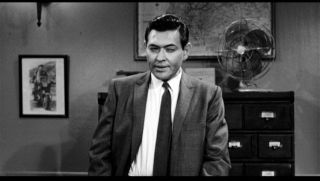The MacGuffin: News and Comment (14/Jun/2008)
(c) Ken Mogg (2008)
June 14
My thanks to reader MR who drew my attention to some Hitchcock references on the Dave Kehr website last month (www.davekehr.com). In particular, it's evident that Kehr, and critic/screenwriter Kent Jones (on the site's Comments pages), would probably support our 'Seriously Alfred Hitchcock' discussion group who recently agreed that, in Psycho (1960), the psychiatrist's scene serves a necessary function though it has often been criticised. (Hitchcock himself knew that the scene risked being 'a hat-grabber', meaning that audiences might get impatient with it.) Those critics, I once suggested, are like the people mentioned by J.B. Priestley who 'have never been into the kitchen'. That is, Priestley was comparing a play to a menu by a master chef: playgoers sometimes complain of individual scenes while forgetting that a menu has several, even many, courses, each designed with the others in mind. Kent Jones put it this way. 'Ultimately, ... it's the whole film that counts. But when you think of Psycho, do you think of [the psychiatrist played by] Simon Oakland? Probably not. Nor are you likely to think of [the sheriff played by] John McIntire telling the story of Norman (Tony Perkins) and his mother. However, the reason I've always disliked Brian De Palma's films is that he has never had the patience for such scenes - he obviously looked at Hitchcock and thought, "I think I'll leave out all the boring stuff and take what's great."' Now, Dave Kehr had this to say about the scene with the psychiatrist: '[it] is clearly meant ironically - as an explanation that explains nothing.' (It does, however, provide a breathing-space for the audience after the excitement immediately preceding it - and a bridge to the scene in Norman's cell which follows, straight after we have heard the psychiatrist say that Norman has now 'become' his mother. So we watch the latter scene with heightened curiosity ...) And Kehr continued: 'Hitchcock underlines this [irony] by framing Simon Oakland against a pitiful little hand sink in the background of his [sic] office, an appropriately impotent echo of the torrents of running water that have been used throughout the film as symbols of the characters' futile attempts to cleanse themselves [of] guilt.' Hmm. That may be the case, but I have previously analysed the scene somewhat differently, and would like to now repeat the gist of my analysis here. First, though, let's note that the shot of the hand sink (basin) occurs only briefly and about half-way through the scene. Much more prolonged and prominent is the set-up shown in the frame-capture below. Behind Simon Oakland are several objects, each of which stands in contrast to ones we've seen earlier. A photo of a motorcycle cop posing innocuously with his bike contrasts with the highway patrolman in his police car who had seemed so threatening to Marion (Janet Leigh). A framed map of Shasta County seems tame compared with the dreamy vista of a windswept desert framed on the wall in the realty office where Marion worked (and had dreamed of escaping to 'a private island' with boyfriend Sam (John Gavin)). And a stilled electric fan contrasts with the whirring fan in the hotel room we've seen in the film's opening scene, when Marion and Sam had made love. As for the filng cabinet symbolically (or actually) reducing each police case to a banal set of jottings on a card, I think forward to how the film Marnie (1964) is another 'case study' brought to life by Hitchcock's story, defying the (deliberately) clichéd credits sequence showing pages turning (as if Marnie were a conventional literary heroine from a 1930s movie produced by Irving Thalberg or David Selznick). Similarly, the basin mentioned by Kehr is another banal object which, yes, contrasts with the dynamics of the shower scene. All of which, I've said previously, reminds me of the famous last line of John Milton's verse-drama about blindness, 'Samson Agonistes' (1671): 'And calm of mind, all passion spent'. Also, as I've previously shown, Psycho has a whole motif of 'blindness' (and 'angels' and 'waiting'), in keeping with its deliberate reference to another even more famous last line by Milton about blindness, namely, in his 16th Sonnet: 'They [certain angels] also serve who only stand and wait.' Psycho screenwriter Joseph Stefano once confirmed to Dr Phil Skerry that he had Milton in mind when he gave the ironic line to Marion, 'They also pay who meet in hotel rooms.' (Note. Almost certainly, Hitchcock would have studied Milton at school.) As for a Hitchcock film being about 'passion' and finally 'passion spent', isn't that true of virtually all of them? Think, say, of Vertigo (1958) with its equally ironic or ambivalent ending (and another garbed mother-figure) ...
This material is copyright of Ken Mogg and the Hitchcock Scholars/'MacGuffin' website (home page) and is archived with the permission of the copyright holder. |

